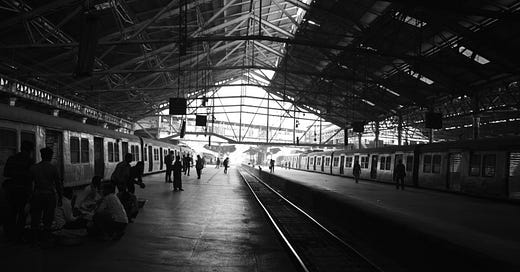There once was a woman who constructed a small apartment on the last platform of the Santa Maria Novella train station. She lived there so long that locals no longer took a second look as they passed by on their way to holiday or work. Her presence was an oddity so constant that it became a comfort.
She built the structure when she was young. It was a large part of her peculiarity. Its intricately carved wooden walls were short enough for her to see over when she stood, which she did often, watching arrivals and departures with fervent interest. The habit made newcomers remark that she must be waiting for someone. But regular commuters would shush them, knowing it was just her way.
Her bed was a pile of crumpled love letters that she nestled into each night with a contented sigh. The travelers knew they were love letters because she would occasionally dismantle her bed; smoothing out the treasured missives to read them over. If someone was patient enough to watch her, they would see her face move from tender longing, to joy, to melancholy, then all the way to agony, at which point the woman would begin to ball up each letter through a strangled rush of tears.
People mostly left the woman in the train station alone. She was no real bother. Her apartment was tidy and she dressed in silk, which was always adorned with pearls. If the occasional curious commuter would ask what she was doing there, her reply was always the same.
“I’m waiting for the train to Vienna.”
That was enough of an explanation for people to nod and walk away content, though some would try to be helpful and inform her when the next one arrived. No matter what train they suggested or when it was scheduled, she never wanted it.
“No, not that train. Another, perhaps.”
It was rare that anyone pressed her more, but if they did, she would explain with only, “I’m not ready yet. And besides, Vienna will wait for me.”
It was true enough. The city had stood for centuries. Surely it would still be there at whenever time she chose. But the time was never right, so the woman continued to wait.
She watched as college students went on riotous weekend getaways, then years later saw those same people board trains holding lovers’ hands. Then some of those hands would bear rings. Soon after they held babies, then toddlers and then grasped at the air around fleeing teenagers.
And as the years slipped away, so did the woman’s vitality. Her dark mass of hair grayed before getting thin and white. Smooth olive skin creased and drooped. The speed at which she stood to watch incoming trains slowed.
Still, she waited.
Locals who remembered the woman from their own youth grew anxious. They knew she did not have much time left to find the right train. So, they began to press her.
“Any train to Vienna must be as good as another,” they’d say.
“It’s not the right time,” she’d explain.
“When will it be right?” they’d ask.
“When leaving here is easy,” she’d reply before shutting her too-short door and retreating to her letter bed.
The conversation was always the same. The time was never right and leaving was never easy. Why, no one knew.
Eventually the woman became so frail that the locals began to beg.
“Please, let me buy your ticket,” they’d offer.
“It’s not a matter of money,” she’d say.
“Then let me drive you to Vienna instead,” they’d plead.
“No, it must be the train,” she’d insist.
When it was clear that the woman would not move, a plan was devised. It was executed on the eve of her eighty-ninth birthday.
The station master, followed by a throng of concerned commuters, crossed all ten platforms to approach the small apartment. He knocked and politely waited for the woman to shuffle to the door. When she answered, he looked at her gravely.
“Madame, I have come to inform you that the last train to Vienna departs tomorrow at noon. You have been waiting a lifetime for this train and I would hate for you to miss it.”
“I see,” the woman said. “Then if this is really the last train, I will have to leave. It won’t be easy, but I will find a way.”
That night, the station master was treated to a bottle of chianti and showered with praise for his masterful performance. The locals felt a party was in order, so they drunkenly bought flowers and balloons to celebrate tomorrow’s occasion.
Everyone arrived worse for wear the next day, but their pounding heads were helped by the thrill of finally seeing the old woman off. Noon neared. She hadn’t emerged from her apartment, and they began to worry.
Only a quarter hour until noon remained when the station master rapped on her door. He waited, tapping the toe of his dress shoe quickly against the platform’s concrete floor. After a few minutes he twisted the brass knob of the woman’s three-quarter oak door. He felt rude going inside her apartment without an invitation, but he was desperate for her to make the train. When he entered, he realized she was already gone. Her frail form was curled in on itself, lying motionless in her bed of bygone love, never to go to Vienna.




Beautiful!